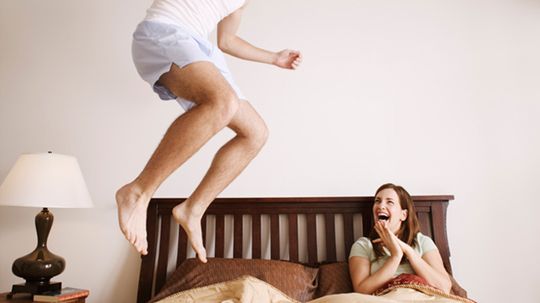Emotions
What are the health benefits of laughter? What is happening in the brain when you're in love? What are the effects of isolation on the mind? Find out in these articles about human emotion.
Learn More / Page 2
Marriage entails waking up beside the one you love and sharing cozy, homemade dinners for two. But when the honeymoon haze clears, are married people happier than singles?
How does a laughter milkshake sound? What about a joy cocktail? Though the former may sound like part of a kid's meal and the latter like a happy hour order, they're both related to laughter yoga.
The authors of chain emails often tell you to smile more, with the added claim that it takes more muscles to frown. Ever questioned this piece of wisdom? We have an answer for you.
By Tom Scheve
Advertisement
Smiling isn't complicated: your mouth turns up, your cheeks lift and your eyes crinkle. You're happy and it shows. But can every smile -- even a fake one -- spread that cheerful feeling?
By Julia Layton
We love to play with and fuss over our pets, but have you wondered if they were having as much fun as you were? Can animals actually feel happiness?
By Josh Clark
What are your happiest childhood memories? What do you remember most about them -- the things you bought or the gifts you received, or the events themselves?
By Josh Clark
From giggles to guffaws and chuckles to cackles, humans laugh in a lot of different ways. But what do each of those laughs mean, and are they all related to humor?
Advertisement
From an adult's point of view, kids have it made, spending their days playing and goofing off, with no responsibilities to worry about. But are kids really jumping for joy more often than the rest of us?
By Tom Scheve
Normally, we laugh because something's funny, but sometimes laughter can be something more serious -- a medical symptom. What separates a hearty guffaw from a signal of poor health?
Happiness is a wonderful thing. Unfortunately, it can also be elusive due to stress or depression. However, strategies abound that you can use to trick yourself into being happy. Ready for 10 of them?
We need food for sustenance and nutrition, but we also eat for pleasure. We like the way some things taste, and enjoy the experience of eating, but can food actually make us happy?
By Josh Clark
Advertisement
Clowns might seem to have more foes than friends, but these entertainers are a key part of laughter therapy in hospitals. There is increasing evidence that a few hearty chuckles can help you along the road to recovery.
Traditional psychology has proven effective in studying and treating mental illness. However, some in the field want to study what makes patients happy instead of what makes them miserable.
By Josh Clark
Exercise, hot peppers, sex: All of these things are said to give you an endorphin rush. What's the science behind this chemical high -- and how do you keep it going?
By Tom Scheve
Kanye West says he says sees music in color. Other people can hear words that make them taste a particular flavor, or they actually feel another person's pain. Welcome to the world of the synesthete. It's a stimulating one.
Advertisement
Your little brother might think it's funny to put a rubber snake in your pocket or jump out from a closet in a dark hallway, but your heart rate might disagree. Is it possible to be scared out of both your wits and your life?
We've all felt fury wash over us. Whether it's the guy who blurts the score to the game you TiVo'ed or the woman who lets the door slam in your face, anger is universal. You might as well learn how it works.
Everyone cries. For some it's an emotional response, while others just shed tears when chopping onions. Are tears a way for us to cleanse our bodies?
By Alia Hoyt
What exactly is fear? In this article, we'll examine the psychological and physical properties of fear, find out what causes a fear response and look at some ways you can defeat it.
By Julia Layton
Advertisement
Most people would recall every detail of being held up in a bank robbery but not so well the details of their last birthday party. The brain is wired for recalling trauma for a very good reason.
Aristotle defined hate as a dislike so intense that whoever feels it wants to cause another person real harm. What is going on in our brains when we hate? And can hate ever be a good thing?
There's a connection between our physical bodies and the way it responds to emotion -- but scientists aren't quite sure what it is. Could it be that happiness is little more than a series of neurochemical responses to the world around us?
By Josh Clark
You think you'd know what happiness was -- you've felt it before, right? Not quite. It turns out that the definition of happiness pretty much depends on who's defining it.
By Josh Clark
Advertisement
Studies seem to indicate that men are more likely to harbor violent tendencies than women. What factors do researchers use to come to these conclusions, and most importantly, is it true that men are more violent?
Why do we help others, even if we know it will hurt us? As it turns out, the concepts of altruism and selfishness may be linked -- much more so than we thought.
By Josh Clark
























